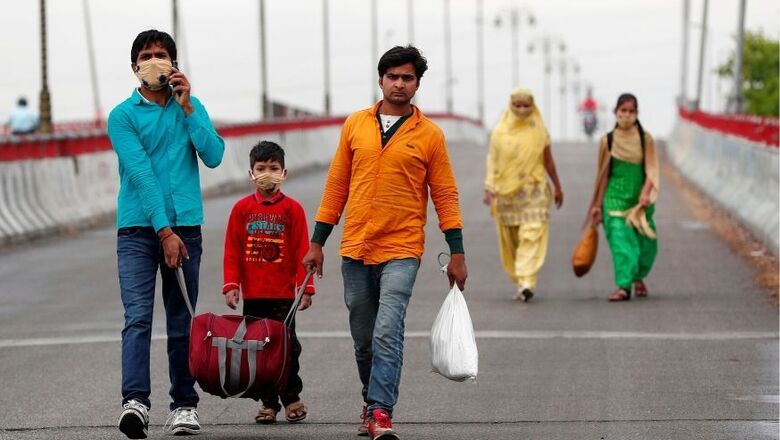
views
Janduka Jaria, 35, walked for close to four days to cover 120km to reach his village. But he was not allowed to enter his home.
A resident of Khunti district in Jharkhand, Jaria works as a brick kiln worker in the nearest city. After sudden imposition of the lockdown, he found no other means but to walk back.
The tedious journey was etched with lack of food, constant fear of dehydration and frequent interruptions by police officers. "What kept my aching legs going was the resolve to be with my family during such a difficult time," Jaria said.
He had informed his friends and family, in the village, of his arrival. However, upon reaching, he could not enter home.
Generally used to store grains, the village headman instructed Jaria to spend his days at a godown on the outskirts of the village. He had to stay there alone and had to cook, wash and clean everything on his own.
Jaria had severe blisters in his legs with all the walking. He was hungry. He wanted to be with his family, but he accepted the village headman’s orders.
"I understand why the sarpanch decided to keep me there. It was for the safety of the entire village, but it was extremely difficult. There was not enough ration on most of the days," he said.
However, what he didn't like was the discrimination meted out to his family members who were not even allowed to enter the premises where he was staying.
They used to go to see Jaria once a day and could only talk to him from a distance. Soon after, villagers started distancing themselves from the family.
"Earlier, villagers used to come and call my wife when it was time to fill water. There was regular exchange of food. All of that stopped after I arrived. My children were not being included in games with their friends. I was the one who had chances to be infected not my family. The villagers seemed to be equally scared of them," said Jaria who has now gone back home after spending half a month alone in the godown.
The bruises in his legs have started to heal but the sudden change in the behaviour of neighbours with whom he has grown up remains with him. “I was born here. I have never seen people isolate a family merely on the chances of a disease," he said.
There seems to be no respite for a migrant labourer in India. He is either cooped up inside a hostile camp, dying on the roads or being subjected to discrimination inside his own village.
The Centre told the Supreme Court earlier this month that between 5 to 6 lakh migrant labourers had walked to reach their villages over the last few days. Many of them lost their lives due to the exertion of the inhuman journey they undertook or were run over by vehicles.
An apex court bench, led by Chief Justice Sharad A Bobde, was informed by the Ministry of Home Affairs last Tuesday that there are more than 10 lakh people in relief camps.
Government-run shelters have accommodated 6.3 lakh of them, while over four lakh workers are staying in homes run by NGOs. The number of active relief camps and shelters run by the government is 22,567, while the figure stands at the 3,909 for NGOs.
The SC hearing was based chiefly on a petition filed by activists Harsh Mander and Anjali Bhardwaj, who said the declaration of the 21-day national lockdown without prior information "precipitated an unprecedented humanitarian crisis" for migrant workers.
Meanwhile, in Bihar, many workers were not even able to enter their own villages.
In Araria district's Jogbani, migrants were reported to police when they reached the village after completing the arduous journey back home. Jogbani is the near the border of India and Nepal. Hundreds of villagers travel to the neighbouring country for work.
"Twelve workers returned home last week. Villagers reported all of them to police. Ambulances and officials arrived soon after, and all of them were handed over to the medical team," said a resident of Jogbani, roughly 295 km from the state capital of Patna.
News18 spoke to police officers in Jogbani and several neighbouring districts who said that it was not a one-off incident and most villages in the state were adopting the same policy.
In fact, the medical teams are now themselves enquiring and transporting any worker who has returned from his/her place of work outside the district.
Villages like Fatehpur, Jamalpur, Alawalpur, Kamarjee, Kandap, Masadhi, Piariya and West Champaran among others have cumulatively reported close to 100 such cases. In some areas, police have also pasted pamphlets on walls of those under quarantine asking others not to visit.
According to estimates, 1.86 lakh migrant labourers have returned to Bihar since the lockdown was imposed last month.
In West Bengal, workers had to undergo quarantines that are unheard of.
Workers who returned to a village in Bengal's Purulia district had to quarantine themselves on tree branches, tying cloth to make some sort of sitting arrangement.
Meanwhile, an elderly farmer in the state who was stranded over 200 km from his Nabadwip home during lockdown had to self-quarantine himself in a fishing boat.
Niranjan Haldar, 65, had travelled to Malda last month to visit his niece. When he developed symptoms like a cough, doctors recommended two weeks of home quarantine.
He then moved into the boat, a partially covered vessel on the Tangan river along the India-Bangladesh border.
Similarly, several workers in Odisha said they had to set up temporary make-shift shanties in rice fields and stay there for half a month before being able to enter their homes.
















Comments
0 comment